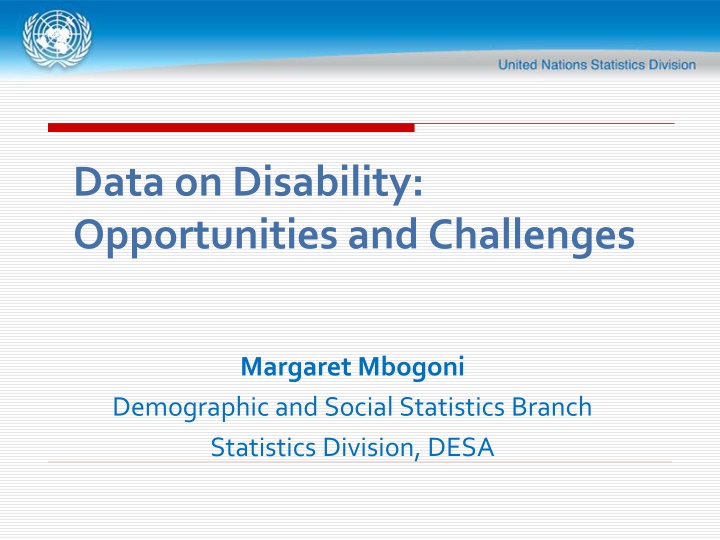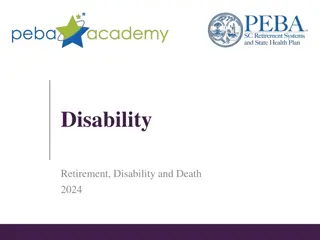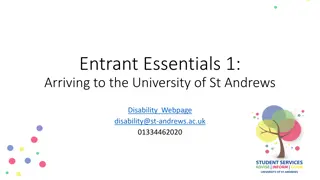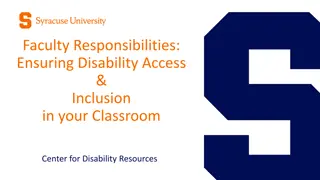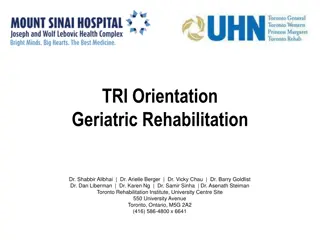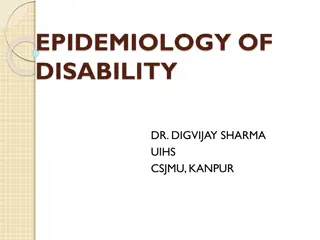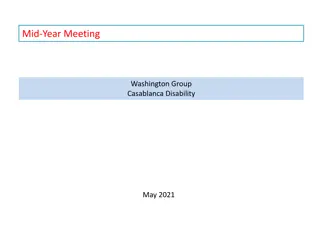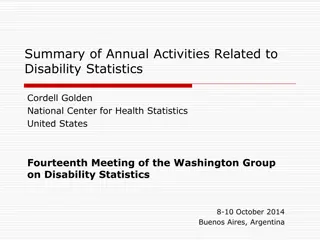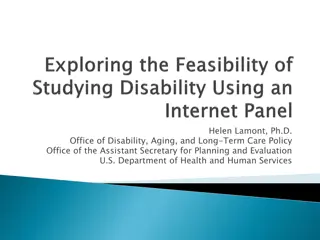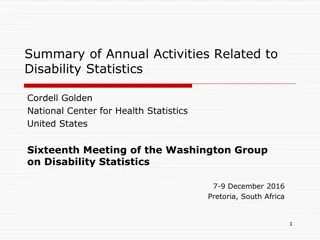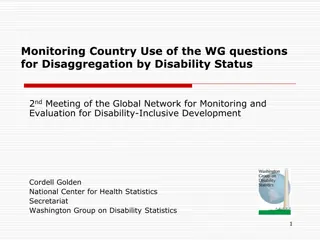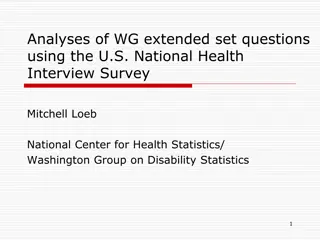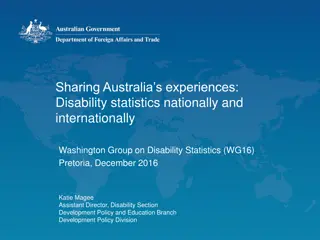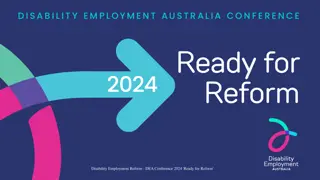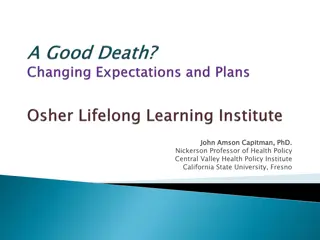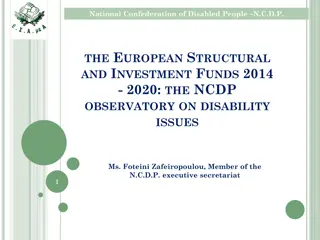Data on Disability: Opportunities and Challenges
Opportunities and challenges related to data collection on disability are discussed in the context of Sustainable Development Goals and the CRPD. Efforts by countries to measure disability, enhance national capacity, and meet data demands for inclusive development are highlighted. The chapter outlines national experiences in disability data collection, including outcomes of regional meetings organized by UNSD. Strategies to ensure no one is left behind and to address barriers faced by persons with disabilities are emphasized.
Download Presentation

Please find below an Image/Link to download the presentation.
The content on the website is provided AS IS for your information and personal use only. It may not be sold, licensed, or shared on other websites without obtaining consent from the author.If you encounter any issues during the download, it is possible that the publisher has removed the file from their server.
You are allowed to download the files provided on this website for personal or commercial use, subject to the condition that they are used lawfully. All files are the property of their respective owners.
The content on the website is provided AS IS for your information and personal use only. It may not be sold, licensed, or shared on other websites without obtaining consent from the author.
E N D
Presentation Transcript
Data on Disability: Opportunities and Challenges Margaret Mbogoni Demographic and Social Statistics Branch Statistics Division, DESA
Contributors United Nations Statistics Division (coordinator) WHO ILO UNICEF Washington Group DHS Program
Context International Mandates 2030 Agenda for Sustainable Development calls for quality, accessible, timely and reliable disaggregated data for monitoring and measurement of progress and to ensure that no one is left behind 2030 Agenda further commits to enhance capacity-building support to developing countries to increase significantly the availability of high-quality, timely and reliable data disaggregated by disability CRPD calls on States Parties to collect appropriate information, including statistical and research data, to enable them to formulate and implement policies related to the Convention and to identify and address the barriers faced by persons with disabilities in exercising their rights States Parties are encouraged to disseminate the statistics and ensure their accessibility to persons with disabilities and others
Objectives of the chapter Discuss current efforts by countries to measure disability Identify strategies to enhance national capacity to meet data demands for disability inclusive development in the context of the Sustainable Development Goals and the CRPD
Outline of the chapter National experiences in disability data collection - summary outcomes of UNSD regional WHO tools for measurement of disability WG tools including those developed in collaboration with other organizations Illustrative example on operationalization of a WG Conclusions and way forward
National experiences in disability data collection UNSD has organized 6 regional meeting to: review national experiences in disability measurement, including challenges faced and lessons learnt during 2010 censuses discuss disability-related SDG indicators for monitoring progress towards inclusion of persons with disabilities in development programmes share national experiences among participating countries and facilitate intra-regional cooperation South East Asia Caribbean African Arabic speaking countries North and Central Asia and Western Balkan States Latin America
National experiences in disability data collection Variations among regions in sources of data Strong reliance of censuses Africa, South East Asia, Caribbean, Arabic speaking countries Multiple sources (censuses, surveys, administrative sources) Latin America, North and Central Asia and Western Balkan States Recognition in all regions that administrative data sources should be strengthened and exploited
National experiences in disability data collection 2030 Agenda - Recognition that for monitoring, unprecedented amount of data is required from NSS data revolution that explores alternative sources of data as well as coordination of the NSS General lack of requisite formal national coordination mechanism for necessary stakeholders
National experiences in disability data collection General lack of experts on disability statistics in their countries Recognized that national capacity building is required in countries on the collection, analysis, dissemination and utilization of data on disability Highlighted the need for technical assistance Outcomes of regional meetings input into revision of UN Guidelines and Principles for Development of Disability Statistics
WHO tools for measurement of disability WHO involved in conceptualization, definition and measurement of disability over two decades Development of ICF a milestone achievement Move from a consequences of health condition or impairment to disability a result of interaction between a health condition and environment WHO engagement in measurement of functioning and disability Multi-country Survey Study (2000-2001) World Health Survey (2003-2004) provided data for World Report on Disability Longitudinal Study on global AGEing and adult health (SAGE) Development of WHO Disability Assessment Schedule
WHO tools for measurement of disability WHO presently supporting member states to collect data on disability and functioning using MDS A general population survey developed by WHO and World Bank in collaboration with a range of stakeholders MDS is WHO s strategy to support member states establish and strengthen monitoring and evaluation systems for disability incl. information on needs and unmet needs, costs, barriers and quality of life MDS operationalizes ICF biopsychosocial model of disability Gives more understanding of lived experience of disability beyond understanding disability as an individual attribute
WHO tools for measurement of disability Data from MDS can be used to quantify impact on disability of health condition or impairment diverse aspects of the environment Allows to make assessments of most beneficial interventions directed at either person and/or environment will produce most benefits A brief MDS developed based on analysis of data from pilot and national MDS datasets to meet national needs for an appropriate version for integration into other household surveys MDS implemented in national surveys Chile, Sri Lanka, Philippines; in preparation in Qatar, Panama, United Arab Emirates, and Costa Rica. Several regional surveys carried out or planned
WG tools for measurement of disability An outcome of 2001 UN International Seminar on the Measurement of Disability A city group under the aegis of the UN Statistical Commission Established to address urgent need for improved and internationally comparable disability statistics Major objective of WG is to provide basic necessary and internationally comparable information on disability WG members identified need for a short set of questions for use in censuses and surveys as priority Has developed WG-SS, WG-ES, CFM, module on inclusive education currently being tested, module on inclusive employment
WG tools for measurement of disability WG-SS adopted in 2006 A set of six questions on walking, seeing, hearing, cognition, self-care, communication Four graded answer categories no difficulty, some difficulty, a lot of difficulty, cannot do Questions and response categories allow calculation of estimates for level of functioning within each domain or among different combinations of domains WG-SS have been used in censuses and surveys of many countries WG-SS intended to identify (in a census or survey format) people with a disability, namely those at greater risk than the general population for participation restrictions due to the presence of difficulties in six core functional domains, if appropriate accommodations are not made
WG tools for measurement of disability WG-ES WG-ES includes domains that could not be included in WG-SS Obtains more information on some domains than provided by WG-SS Obtains more information on use of mobile assistive devices in order to assess functioning Includes WG-SS plus domains on affect (anxiety and depression), pain, fatigue, and upper body functioning Four scaled response categories for describing functioning in each domain
WG tools for measurement of disability WG/UNICEF Child Functioning Module (CFM) launched 2016 Developed to address the aspects of child development not addressed in previous WG tools WG embarked upon the development of a separate module that would specifically address child functioning Determines disability through a series of questions on difficulty functioning that would place a child at risk of participation restrictions in a non-accommodating environment Module composed of two sub-modules: childn2-4 yrs; childn5-17 yrs Child s mother or, if mother not alive or is not living with child, primary caregiver is recommended respondent
WG tools for measurement of disability UNICEF/WG Module on Inclusive Education focus on formal education In support of promotion of right to education for children Module assesses the school environment and participation Provides information on environmental influences on participation in school and identifies bottlenecks Responses from parents to questions on attitudes of general adult population towards educ. for all children and specifically for CWDs Responses from caregivers of children who are attending school to evaluate accessibility of physical space, curriculum, teachers attendance, etc Questions on out-of-school children to understand barriers to school participation safely, transportation, accessibility of curriculum, etc.
WG tools for measurement of disability WG/ILO Module on Disability and Employment for inclusion in LF surveys Module undergoing cognitive testing and covers: Disability identification WG-SS + two additional questions on upper body mobility focusing on lifting and using one s hands and fingers Date at onset Barriers Accommodations Attitudes Social protection
WG tools for measurement of disability WG conducts workshops on implementation of tools Provides assistance and advices through webinars, phone, email as requested Website with documentation, including blog, FAQ
Illustrative example on operationalization of a WG tool Demographic and Health Surveys (DHS) Program Began in 1984 with more focus on demography Has evolved over time with more questions added In 2015, The Demographic and Health Surveys (DHS) Program piloted and finalized an optional module of questions on disability based on WG-SS Module included in household questionnaire covers six core functional domains: seeing, hearing, communicating, remembering and concentrating, walking, and washing all over and dressing One respondent provides information on all hhd members 5yrs+
Conclusions and Way Forward Recognizing need for data by countries on one hand and various stakeholders in disability measurement on the other hand Need for concerted collaboration for benefit of countries Development of guidelines National capacity building activities Use of advanced technologies for data collection and dissemination Training on processing, analysis and dissemination of data Strategies for enhanced utilization of data at national level
